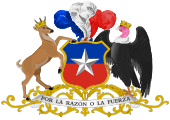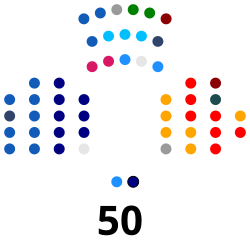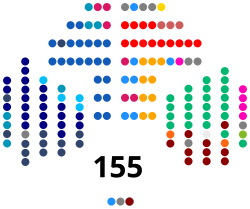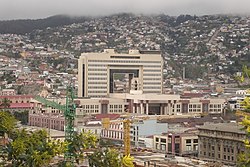| National Congress of Chile Congreso Nacional de Chile | |
|---|---|
| LVI legislative period | |
 Coat of arms of Chile Coat of arms of Chile | |
| Type | |
| Type | Bicameral |
| Houses | Senate Chamber of Deputies |
| History | |
| Founded | July 4, 1811 (First National Congress) |
| Leadership | |
| President of the Senate | José García Ruminot |
| President of the Chamber of Deputies | Karol Cariola |
| Structure | |
| Seats | Total: 205 50 senators 155 deputies |
 | |
| Senate political groups | Government (18)
External support (5)
Opposition (27)
|
 | |
| Chamber of Deputies political groups | Government (67)
External support (7)
Opposition (81)
|
| Length of term |
|
| Meeting place | |
 | |
| Edificio del Congreso Nacional Valparaíso Chile | |
| Website | |
| Cámara de Diputados (in Spanish) Senado (in Spanish) | |
The National Congress of Chile (Spanish: Congreso Nacional de Chile) is the legislative branch of the Republic of Chile. According to the current Constitution (Chilean Constitution of 1980), it is a bicameral organ made up of a Chamber of Deputies and a Senate. Established by law No. 18678, the city of Valparaíso is its official headquarters.
Chile's congress is the oldest operational in Latin America and one of the oldest in Ibero-America. The First Chilean National Congress was founded on July 4, 1811, to decide the best kind of government for the Kingdom of Chile during the captivity of King Ferdinand VII in the hands of Napoleon.
The Chamber of Deputies is constituted by 155 members called deputies or diputados in Spanish and they are elected for a four-years period. Re-election is possible for a maximum of two times, which means that the deputy may remain in the post for up to 12 years. The country has 60 electoral districts and each one is represented by two deputies.
The Senate is formed by 50 senators elected for an eight-years period and may go for re-election one time, which means a senator can remain in the role for 16 years. The electoral division is different from the deputies, it is made of 19 senatorial constituencies (Spanish: circunscripción senatorial), where two senators are elected per constituency.
The Congress's powers, duties and processes are defined in articles 42 to 59 of the current constitution of 1980 and through the Constitutional Organic Law No. 18918 published in 1990.
The current electoral system (or voting system) in Chile is proportional and inclusive according to the 2015 update of the organic law No. 18700, article 179 bis.
The National Congress was closed without an immediate renewal of the members of its two chambers during three periods: 1924-1925, June-October 1932 and 1973-1989.
A new four-years legislative period begins with the installation of the National Congress. The LVI legislative period of the Chilean Congress began on March 11, 2022 and will end in 2026.
History
Patria Vieja
Main article: First Chilean National CongressPatria Nueva
Main article: Chilean Declaration of IndependenceDictatorship 1973-1990
On 13 September 1973, the Government Junta of Chile dissolved Congress.
During the last years of the Pinochet regime, the current building of Congress was built in the port city of Valparaíso, some 140 km west of the country's capital, Santiago. This new building replaced the Former National Congress Building, located in downtown Santiago.
Transition to Democracy
Between 1989 and 2013, elections in Chile were carried out following a binomial voting system, which was prescribed in 1980 during the Military dictatorship of Chile.
The binomial system was considered by most analysts as the main constitutional lock that prevented completion of the Chilean transition to democracy.
See also
| Politics of Chile |
|---|
 |
| Executive |
| National Congress |
| Judiciary |
| Law |
| Administrative divisions |
| Recent elections |
| Independent institutions |
|
Foreign relations
|
|
|
References
- Cabrera-Tapia, Roberto (2021). "The Chilean Congress: Bicameralism in a Presidential System" (PDF). PSA Parliaments specialist group.
- Nacional, Biblioteca del Congreso. "Biblioteca del Congreso Nacional | Ley Chile". www.bcn.cl/leychile (in Spanish). Retrieved 2024-04-02.
- ^ Congreso Nacional de Chile, Biblioteca (2014-11-27). "Limits to the re-election of deputies and senators". Portal de la Biblioteca del Congreso Nacional de Chile (in Spanish). Retrieved 2024-04-02.
- Nacional, Biblioteca del Congreso. "Biblioteca del Congreso Nacional | Ley Chile". www.bcn.cl/leychile (in Spanish). Retrieved 2024-04-02.
- Biblioteca, Congreso Nacional de Chile. "Organic law about popular vote". www.bcn.cl/leychile (in Spanish). Retrieved 2024-04-02.
- "Junta general names himself as new President of Chile". The Guardian. 14 September 1973. Retrieved 31 October 2018.
External links
| Chile articles | |||||||||||
|---|---|---|---|---|---|---|---|---|---|---|---|
| History |
|  | |||||||||
| Geography | |||||||||||
| Politics |
| ||||||||||
| Economy | |||||||||||
| Society |
| ||||||||||
| Legislatures in South America | ||
|---|---|---|
33°02′52″S 71°36′21″W / 33.04778°S 71.60583°W / -33.04778; -71.60583
Categories:
